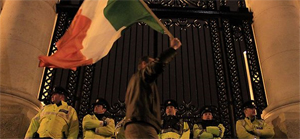 Ireland Races to Secure Weekend Aid Deal Amid Bank Concern
Ireland Races to Secure Weekend Aid Deal Amid Bank Concern
Ireland is in the final stages of negotiating an international bailout for its banks before markets open on Monday as workers march to protest budget cuts.
Euro region finance ministers may seal an agreement with Ireland tomorrow at a meeting slated to start at 1 p.m. in Brussels, European Union officials said on condition of anonymity. Prime Minister Brian Cowen estimates it may amount to 85 billion euros ($112 billion.)
Irish police estimate 20,000 people took to the streets of Dublin as bailout talks focus on the interest rate charged to Ireland and the fate of senior bondholders. A finance ministry spokesman said the rate will be “sustainable” after state broadcaster RTE reported that nine-year loans from the EU and the International Monetary Fund may cost as much as 6.7 percent.
“This is the result of allowing speculators, bankers and developers to run riot, pillaging and ruining our economy,” said Jack O’Connor, head of the Irish Congress of Trade Unions, in a statement.
The need for a pact is intensifying as capital flows out of Irish banks. The government in 2008 told senior bondholders they wouldn’t lose their money if banks failed. The risk now is that breaking the pledge may spark a rout in other euro-region debt.
“One possible scenario is that the financial package for Ireland could include an element of restructuring affecting senior debt,” Fitch Ratings said in a statement yesterday. “Fitch has no visibility of this matter but notes that such a restructuring could have wider implications for the euro area.”
Burning Bondholders?
Ireland’s woes are having domestic political repercussions.Cowen’s party yesterday lost a special election for a vacant parliamentary seat to a Sinn Fein candidate who said he wanted to “burn” holders of bank debt.
Ireland’s loans will probably come from the IMF, the European Commission and the European Financial Stability Facility. The IMF rate will be the cheapest and the rate from the EFSF, which provides most of the funds, will be the most expensive, RTE said.
The average rate on three-year loans will be around 5.5 percent, the Irish Times said, citing an unidentified person familiar with the negotiations. Greece was charged around 5 percent by the EU for three-year loans when in May. The IMF charged around 3.4 percent for most of its portion.
“The government in my view needs to play hardball,” Leo Varadkar, a spokesman for the opposition Fine Gael party, said on RTE.
Bond Selloff
Allied Irish Banks Plc and Bank of Ireland Plc bonds fell yesterday on concern the government will abandon a pledge to protect senior bondholders and force them to share the bailout costs. EU and IMF officials are taking legal advice on how senior bondholders can share the cost of the rescue without triggering lawsuits, the Irish Times said yesterday, without saying where it got the information.
While deposit outflows have “stabilized” in recent weeks, Anglo Irish Bank Corp. Chairman Alan Dukes told Bloomberg Television two days ago that the nationalized lender lost about 12 billion euros of deposits this year and that “other banks are having similar problems.” Anglo Irish yesterday had its long-term counterparty credit rating cut to below investment grade by Standard & Poor’s, which cited concerns about sovereign support for the bank.
Contagion Risk
Deposits at Allied Irish and Bank of Ireland have fallen by a combined 22 billion euros since the end of June, according to estimates from Emer Lang, an analyst at Dublin-based securities firm Davy.
Ireland’s crisis is now forcing Portuguese and Spanish politicians to quell speculation that they are next in line for rescue. The average yield investors demand to hold 10-year debt from Greece, Ireland, Portugal, Spain and Italy yesterday reached a euro-area record of 7.57 percent. By contrast, Germany pays 2.73 percent.
Portugal and Germany yesterday denied a report in the Financial Times Deutschland that Portugal is being forced to seek aid. The country’s parliament yesterday approved the government’s 2011 budget proposals, which include the deepest spending cuts in more than three decades. The European Central Bank bought the country’s bonds yesterday, according to people familiar with the transactions.
In Spain, Prime Minister Jose Luis Zapatero told Catalan radio RAC1 that investors who are “short” on Spain “are going to be wrong and will go against their own interests.” Finance Minister Elena Salgado said that Spain will issue less debt at the remaining auctions of 2010 because the nation’s financing needs for this year are already covered.
“The sovereign debt crisis has gone from third to fifth gear in just a matter of days,” said Kathleen Brooks, research director at Gain Capital Group LLC in London. “Whereas the Greek crisis and the start of the Irish crisis were concerned with individual sovereigns and their problems, the current chapter of Europe’s sovereign woes has turned into a periphery- wide issue where no one is safe.”




